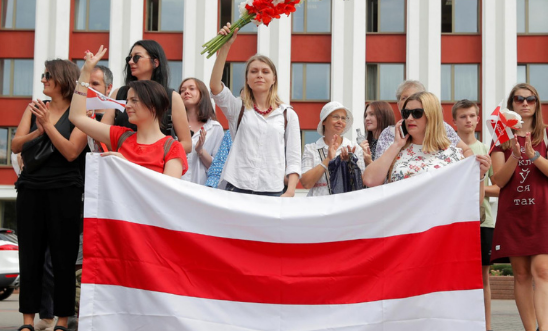
Press releases
Belarus: women activists subject to threats and abuse for taking part in protests - new report

‘Belarus: Women on the Front Line’ highlights the important role women activists have played in recent protests
‘In a deeply patriarchal society with endemic domestic violence, women in Belarus have risked everything to stand up for their beliefs’ - Aisha Jung
Women who have played prominent roles in the protests sweeping Belarus are subject to reprisals and threats, Amnesty International said today.
In its new report, Belarus: Women on the Front Line, Amnesty highlights the important role women activists have played in the protests after widely contested presidential elections and reveals state reprisals against them too.
Women activists told Amnesty that they had been accused of being “bad mothers” and “bad wives”, and that the authorities had threatened to take their children away from them. They have also faced ill-treatment in detention, and prison sentences resulting from unfounded criminal prosecutions.
Aisha Jung, Amnesty International’s Senior Campaigner on Belarus, said:
“Svyatlana Tshikhanouskaya, a presidential contender forced into exile; Maryia Kalesnikava, her chief of staff thrown into prison; Marfa Rabkova, a jailed human rights defender; and journalists Katsyaryna Bakhvalava and Darya Chultsova, both imprisoned for two years for livestreaming of a protest action – these are some of the many women whose names have become synonymous with the struggle for freedom and human rights in Belarus.
“In a deeply patriarchal society with endemic domestic violence, women in Belarus have risked everything to stand up for their beliefs. The Belarusian authorities have retaliated with measures intended to target women activists, and their organisations and families.
“We call for solidarity with the brave women of Belarus in their fight for freedom and human rights. In their struggle, they are challenging patriarchal attitudes and a repressive government intent on suppressing human rights and stifling the change and progress that Belarusians are calling for.”
Yuliya Mitskevich, a feminist activist who runs a gender-awareness organisation called Aktyunym Byts Faina (It’s Great to be Active), and who is a member of a sub-group of the opposition Coordination Council, Femgruppa, was arrested outside her workplace on Friday 20 October last year.
Yuliya was officially charged with “participation in an illegal gathering”, but she told Amnesty she believed she is being persecuted for her work on gender equality. The police officers who arrested Yuliya, and criminal investigators who interrogated her, asked her to sign a statement saying that she had taken part in illegal actions in her organisational role.
Yuliya said:
“They offered me incentives and threatened me too. The first time they asked about Femgruppa, and about the women’s marches and finances, but the second time they were interested in my organisation.”
Weaponised justice system
Earlier this year Amnesty published a report revealing how the Belarusian authorities have weaponised their justice system to punish survivors of torture rather than perpetrators.
Belarus is currently experiencing the most egregious clampdown on human rights in its post-independence history.
Since the beginning of the post-election protests, the Belarusian authorities have arbitrarily detained thousands of people and subjected hundreds to abuse and torture as part of the country’s widespread and brutal crackdown on dissent.
Amnesty has heard harrowing accounts of peaceful protesters being arrested en masse and subjected to torture, stripped naked, mercilessly beaten, held in stress positions, and deprived of food, drinking water or medical care for days.